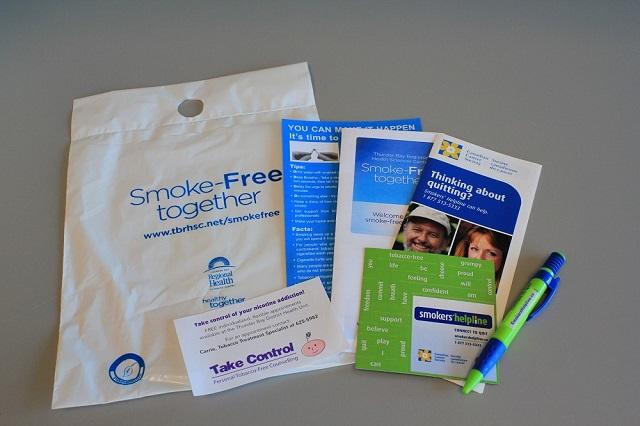National Non-Smoking Week: It’s never too late to quit
by Sara Chow

January is Tobacco Reduction Month, and a big part of the month’s events includes National Non-Smoking Week, held from January 18th-24th. National Non-Smoking Week is designed to raise awareness, prevent individuals from starting to smoke, help people who smoke to quit, and promote smoke-free environments.
This year, Thunder Bay Regional Health Sciences Centre (TBRHSC) is partnering with the Thunder Bay District Health Unit and the Canadian Cancer Society to focus on helping people to quit smoking. Naomi McNeill, Smokers’ Helpline Coordinator at the Canadian Cancer Society, wants people to know that it’s never too late to quit smoking. “Your body starts to repair itself quickly after quitting smoking. Depending on the person, within 2 weeks to 3 months circulation improves, walking becomes easier and lung function can increase up to 20 percent.”
When healthcare professionals tell their patients it’s never too late to quit, the evidence also supports this. “Cancer patients should know that even though they already have cancer, it’s not too late to quit. Research demonstrates that quitting smoking can make your treatments more successful, lengthen your life, and even improve your quality of life during treatment,” says Dr. Nicole Laferrier, Acting Chief of Oncology with Regional Cancer Care Northwest at TBRHSC. “There is help available for patients to help them quit smoking. Make sure you talk to your healthcare provider about it.”
Some opportunities for quitting smoking this year include:
The Driven 2 Quit Challenge: This is a quit smoking contest that encourages Ontario adult smokers to make a quit attempt for the month of March 2015. The grand prize for one lucky person who quits for the entire month is a new car! Since 2006, the Challenge has inspired more than 213,000 quit attempts. For more information, visit: www.driventoquit.ca
Take Control: A free, individualized personal tobacco-free counseling offered by the Thunder Bay District Health Unit. Call (807) 625-5982 for more information.
The Quit CoachTM: Personal smoking cessation program with Jim Morris, a tobacco cessation coach. For more information call (807) 472-6309 or visit www.thequitcoach.ca
Smoker’s Helpline: A free, confidential service operated by the Canadian Cancer Society offering support and information about quitting smoking and tobacco use. Services are offered by phone, online, or via text messaging. For more information call 1-877-513-5333 or visit www.smokershelpline.ca
Smoking Cessation at TBRHSC: Patients, families, staff, and volunteers are encouraged and supported to be smoke-free while at TBRHSC. Inpatients who smoke have access to free Nicotine Replacement Therapy (NRT) and a Smoking Cessation Nurse who provides counseling and follows patients for up to 1 year post-discharge. Families and visitors have access to free ‘Care Kits’, available at the Information Desk, that contain information and resources on quitting smoking and supports. For more information, visit: www.tbrhsc.net/smokefree
“Quitting smoking isn’t easy to do, but it’s worthwhile,” says McNeill. “Motivation and incentives such as the Driven to Quit Challenge encourage quit attempts, and every quit attempt gets you that much closer to being smoke-free for good.”